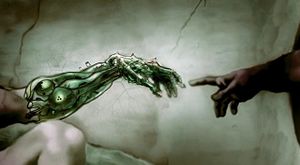Transhumanism as a religion

Transhumanism has been compared to a religion from time to time. One can analyse this comparison by analysing existing definitions of religions:[1]
Overview[править]
Many transhumanist commentators such as theologian Ted Peters have made favourable characterisations of transhumanism as a religious movement.
Albert R. Antosca suggests transhumanism blurs the link between strictly atheistic and religious beliefs.[2]
The belief in and worship of a superhuman controlling power, especially a personal God or gods[править]
Example: "ideas about the relationship between science and religion"
God[править]
Belief in a god or the supernatural is not inherently required by transhumanism, a position very strongly held by many atheistic transhumanists, some of whom argue transhumanism is, or should be inherently atheistic. However there are a number of religious groups involved in transhumanism such as the Christian Transhumanist Association and Mormon Transhumanist Association. So what does this mean?
Spiritualism[править]
Although not all transhumanists believe in a higher power, many individuals and some groups within the movement as a whole may take alternative positions. An increasing number of people describe themselves as spiritual but not religious and would not full under this definition. Buddhist transhumanism is arguable more spiritual than religious.
Individuals such as Ben Goertzel have expressed an interest in panpsychism. There may be other such positions within the community.
Postsecularism[править]
Postsecularism is sometimes used as a descriptor of the movement to describe the complex convergence of these views as applied to the movement.[3]
A particular system of faith and worship[править]
Example: "the world's great religions"
Faith[править]
Transhumanists could be argued to have in faith in certain techno-optimistic ideas such hope for the future or anticipation of various future desirable scenarios. Transhumanists may consider transhumanistic goals as transhumanist inevitablism, scenarios such as an AI that helps humanity, maybe a technology that can save the world's eco system, or emerging technologies covered here and in the community. Not all transhumanists are likely to agree with this specific goal or end point. Some may have their hopes pinned on the singularity, others may see new life extension technologies coming via biological methods, and some are just in it for the laser guns and robotic legs that make them run like The Flash.
Worship[править]
There is an element of cult of personality associated with prominent figures such as Ray Kurzweil and his telepresence robot appearances, or Aubrey de Grey and his outstanding beard. Elements of technophilia could be comparable, as well as scientism and technoprogressivism and other political ideas. Few would argue these relationships constitute worship however.
Structures[править]
A few small initiatives have directly brought together the ideas transhumanism or life extensionism into new age type initiatives:
There however are a very fringe element of the movement.
Religious transhumanism associated with established religion tends to provide a continuity of the existing structures rather than developing exclusively transhumanist ones.
A pursuit or interest to which someone ascribes supreme importance[править]
Example: "consumerism is the new religion"
Many trends in popular culture have been compared to religions, from Kim Kardassian's ass, through to belief in alien abductions or conspiracy theories.
It is not clear how seriously a typical transhumanist rates the movement in their life. Indeed, there may be many de facto transhumanists who work entirely independently of the movement.
Certain advocates such as Eliezer Yudkowsky have showcased the importance of the idea through their writings, whilst People Unlimited use evangelical style energetic rhetoric to motivate people about longevity. These may be exceptions however.
Transhumanism as a Cult[править]
One other similar term sometimes used by Anti-transhumanists is to describe transhumanism is as a cult.
Simple Definition of cult
- a small religious group that is not part of a larger and more accepted religion and that has beliefs regarded by many people as extreme or dangerous
- a situation in which people admire and care about something or someone very much or too much
- a small group of very devoted supporters or fans [5]
Definition 1 is taken care of above, let's look at the other 2 points.
a situation in which people admire and care about something or someone very much or too much
If you can define "very much" or "too much", then yes it could be described as a cult. It's no more a cult than anything else in the world though. Animal rights activists could be called cultist, fan bases of sports teams large and small, etc. etc. Ditto for the next definition:
a small group of very devoted supporters or fans
Again, the term "cult" can be applied to almost anything.
Reasons for labelling it a cult are most likely because of the negative connotations associated with the word. Largely used by dark mainstream media conglomerates who want to control your mind with their programming. (see how persuasion works?)
See also[править]
External links[править]
References[править]
- ↑ Google:religion definition
- ↑ Thinking Outside the Old Religious Box Transhumanism is complicating the sometimes antagonistic relationship between faith and science.
- ↑ Transhumanism is not Atheism and is often Misrecognized Religion
- ↑ On the playa this year, experience reality as a crowd-sourced sim. "First Church of the Singularity". Take the red pill
- ↑ Definition of Cult